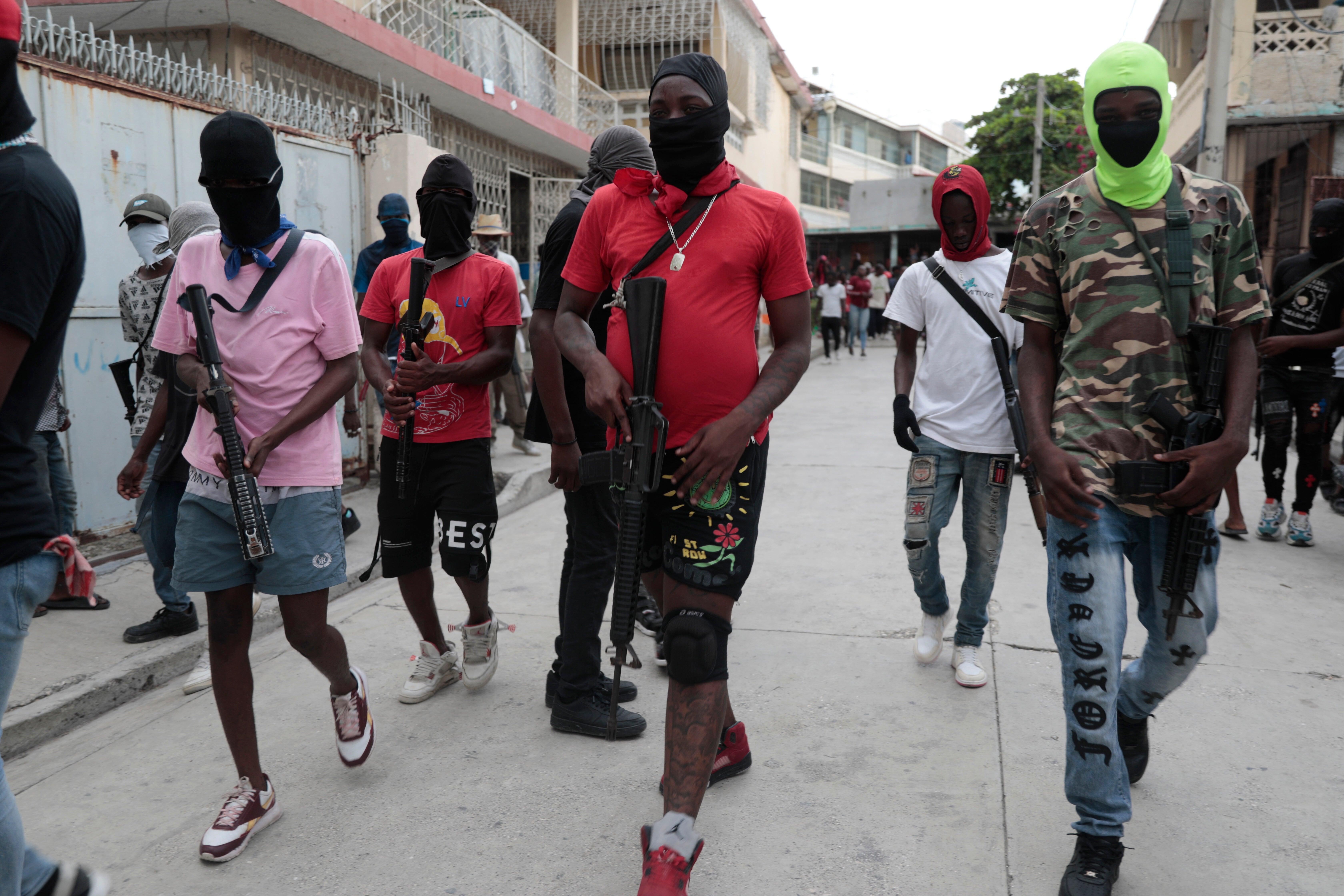What to know about a UN vote to send a Kenya-led force to Haiti to curb gang violence
The U.N. Security Council is preparing to vote on a resolution to authorize a multinational force to Haiti led by Kenya to help combat violent gangs that have grown incredibly powerful and overwhelmed police

Your support helps us to tell the story
From reproductive rights to climate change to Big Tech, The Independent is on the ground when the story is developing. Whether it's investigating the financials of Elon Musk's pro-Trump PAC or producing our latest documentary, 'The A Word', which shines a light on the American women fighting for reproductive rights, we know how important it is to parse out the facts from the messaging.
At such a critical moment in US history, we need reporters on the ground. Your donation allows us to keep sending journalists to speak to both sides of the story.
The Independent is trusted by Americans across the entire political spectrum. And unlike many other quality news outlets, we choose not to lock Americans out of our reporting and analysis with paywalls. We believe quality journalism should be available to everyone, paid for by those who can afford it.
Your support makes all the difference.The U.N. Security Council is preparing to vote on a resolution to authorize a multinational force to Haiti led by Kenya to help combat violent gangs that have grown incredibly powerful and overwhelmed police.
Haiti first requested such an intervention in October 2022, but neither the U.S. nor the U.N. were willing to lead one, and U.S. efforts to persuade Canada to do so were unsuccessful.
Then Kenya stepped up in July with an offer to lead a multinational force. The U.S. forwarded a resolution to the U.N. Security Council to authorize the force, and the council was expected to vote on it Monday afternoon.
Some things to know:
WHO REQUESTED THE ARMED FORCE AND WHY?
Haitian Prime Minister Ariel Henry first requested the immediate deployment of an armed force in October 2022. At that time, a powerful gang alliance known as “G9 and Family” led by a former police officer had seized control of a key fuel terminal in the capital of Port-au-Prince, paralyzing the country and cutting off access to water, fuel and basic goods.
The gang eventually allowed fuel trucks to enter the area, but since then, gangs have only grown more powerful. From Jan. 1 to Aug. 15, more than 2,400 people in Haiti have been reported killed, more than 950 kidnapped and more than 900 injured, according to U.N. statistics.
More than 200,000 others have lost their homes as rival gangs warring over territory pillage communities. Haiti’s National Police have launched several operations targeting gangs, but the police agency is under resourced, with only 10,000 active officers for a country of more than 11 million people.
WHY IS THE U.N. SECURITY COUNCIL INVOLVED?
U.N. Security Council approval of a deployment of a foreign armed force to Haiti helps gives the intervention weight under international law. The council has 15 members, and a majority of nine votes is needed for a decision.
Only five members, the U.S., U.K., China, France and Russia, are allowed to veto proposals. Just one veto means a decision or resolution would not be approved. Countries also can abstain instead of casting a veto.
WHAT DOES THE RESOLUTION SAY?
The seven-page resolution drafted by the U.S. government and obtained by The Associated Press would authorize a one-year deployment of a multinational armed force to help Haiti fight gangs. It welcomes Kenya’s offer to lead the force, which would be funded by voluntary contributions, with the U.S. already having pledged $100 million.
The resolution calls for the force to be reviewed after nine months, and for leaders of the mission to inform the council of the mission’s goals, rules of engagement, financial needs and other issues before a full deployment.
The resolution calls for the force to work with Haiti’s National Police to “counter gangs and improve security conditions” as well as secure key infrastructure such as ports, the airport and critical intersections. The force also would be allowed to “adopt urgent temporary measures on an exceptional basis” to prevent deaths and help secure the country.
WHAT DO HAITIANS THINK OF THE PROPOSAL?
Haitians are skeptical about a foreign armed force given a sexual abuse scandal and deadly cholera outbreak that followed the 2004 deployment of a U.N. stabilizing mission that lasted 13 years.
However, Haitians also acknowledge there are few other options that could help quell violence inflicted by gangs estimated to control up to 80% of Port-au-Prince.
Critics of the plan note that police in Kenya have been accused of killings and torture, and some wonder how an English-speaking force would interact with a population that speaks mostly Haitian Creole.
WHEN WAS A FOREIGN FORCE LAST SENT TO HAITI?
There have been at least three major foreign military interventions in Haiti since the early 1900s led by the U.S. and the U.N.
The last time a force was deployed to Haiti was in June 2004, when the U.N. approved a stabilization mission after former Haitian President Jean-Bertrand Aristide was overthrown in a rebellion initially organized by a street gang. The upheaval prompted the U.S., France, Canada and Chile to send troops that were soon replaced by the U.N. mission that ended in 2017.
The U.N. mission was marred by allegations that more than 100 U.N. peacekeepers had engaged in sexual misconduct, including sexual abuse of minors. Also, sewage runoff from a U.N. peacekeeper camp was blamed for a cholera epidemic in which nearly 10,000 people died.